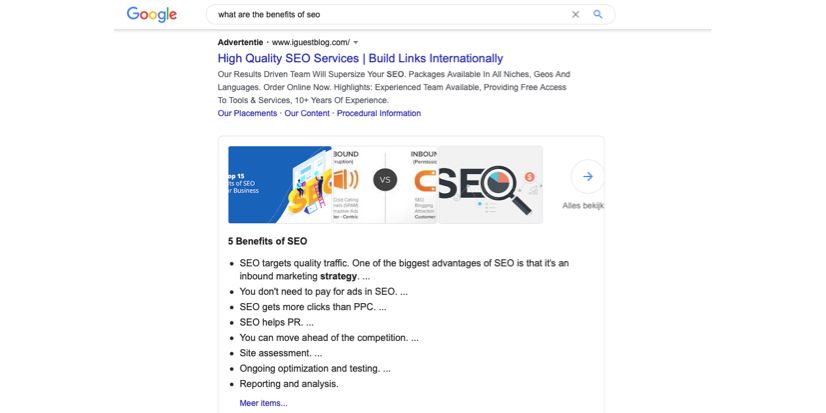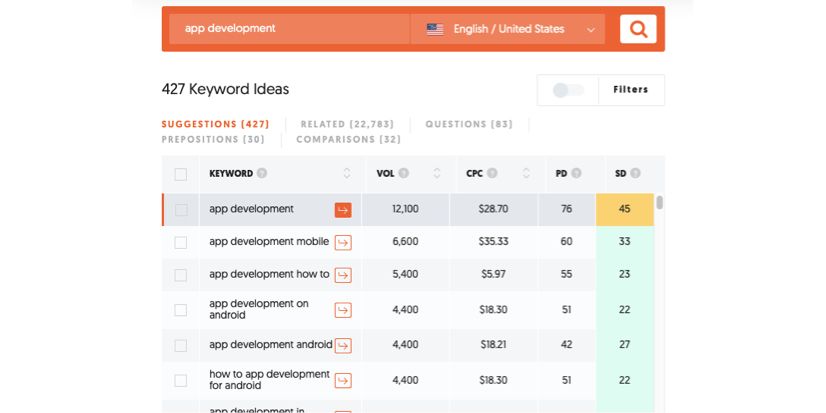7 Ways to Effectively Optimize Your SEO
Get the latest updates about our blog posts.
Subscribe so you don’t miss out!
SEO, or search engine optimization, is a very well known term for most website owners or anyone with some knowledge of digital marketing. It refers to the continuous process of working towards a high ranking in search engines like Google. Google ranks websites and webpages by a list of different factors, that all contribute to the success of your website in Google’s search results. A few examples of these factors include:
- The use of certain keywords in headings, texts, and metadata
- The time people spent on your website
- The bounce rate of your website
- The pageviews on specific webpages
- Incoming and outgoing links
- The general page loading speed
- The copy text on the landing page
In this blog, we’ll have a look at what essential steps you can take to improve the SEO of your website and rank higher in Google’s search results. Although most of these steps are pretty straightforward, they are often neglected or overlooked when trying to improve the SEO of a website.
1. Optimize the page loading speed
Improving the page loading speed of your website can already improve a lot. When someone accesses your website and immediately faces a website that isn’t loading properly, chances are very high that they won’t wait for it and take their leave. Of course, this is definitely not what you want if you’re aiming for more visitors and higher search engine rankings. Make sure that your website is always up-to-date with the latest software updates, enable browser caching, and reduce the file sizes of the images on your website. A great tool for this is Chrome’s Lighthouse, which is an open-source and automated tool for checking and optimizing the quality of web pages. It checks the most essential stats of any web page, like the overall performance, accessibility, functionalities of progressive web apps, SEO, and much more. If you’re not hosting, maintaining or updating your website yourself, but have a professional digital partner do it for you, they generally make sure these things are taken care of.
2. Implement Google Search Console
Google Search Console is one of Google’s most popular services/tools made to help you with your search engine optimization. Connecting Google Search Console with your website, the tool gives you insights into SEO-related statistics like the total amount of clicks or pageviews, your current ranking in Google’s search engine. Another handy asset Google Search Console offers to its users is a real-time insight into errors on your website. Google’s URL crawler makes its way through thousands of publicly available web pages. Crawlers look at web pages and follow links on these pages, crawling from link to link in order to find errors and send feedback to the website’s owner. Errors on your web pages can result in a negative effect on the amount of visitors you’re attracting, as well as your ranking in search engines.3. Implement featured snippets
If you’ve used Google’s search engine in the past, you’ve probably noticed its featured snippets. Featured snippets are selected search results that are featured on top of Google’s organic search results, often shown below the advertisements. They appear in confined “boxes” with a few images and some text below, which consist of a short “snippet” of text or a short list of bullet points that aim to answer your question in a summarized and quick way. It’s a very simple way of attracting more attention towards your website and its content. Here are some ways to optimize your web page for Google’s featured snippets:
- Keyword research: aim for question-like search queries
- Compare your keywords with the results in the “People also ask” box
- Make sure your SEO for Google’s search engine ranking is on point
- Use words that are likely to generate featured snippets
- Stick to the optimal word count, which lays between 40 and 50 words
- Add a Q&A page to your website. This makes it more likely for Google to find your content usable for quickly answering frequently asked questions

4. Implement metadata and backlinks
A quick and easy way to optimize your ranking in search engines is by implementing meta data and backlinks in all your pages. Meta descriptions are pieces of text consisting of approximately 155 - 160 characters. They serve as little summaries of the content of a web page. For example, if you have written a blog about SEO, you can strengthen its visibility by tagging that page with a meta description with the most important keywords relevant to what you’ve written. This way, Google can use your meta descriptions to add to your link in its search results, which heightens the chance of more web traffic. Besides metadata, backlinks can also make a great difference in your SEO. Links and link texts let Google’s crawler bots identify the relevance of specific webpages to each other. One way to improve the relevance of your website’s links and backlinks is by removing or fixing broken links, which you can find with Google Search Console.
5. Optimize your website for all devices
This one is pretty straightforward: the more devices your audience can use to access your website and its functionalities, the more traffic your website will generate. Nowadays, we see a massive increase in traffic coming from mobile devices, and Google sees it too. In 2018 Google announced that they will prioritize all mobile versions of a web page for indexing and ranking. Because of this, it is essential that your web pages are optimized for mobile devices. You can do this, among other things, with the implementation of a responsive design, which automatically adjusts the dimensions of your website for different screen sizes and devices. Next to that, it is also good to make sure that there are no disruptive advertisements or pop ups in the mobile version, and that all images files are reduced to a minimum to optimize the loading speed of your website.
6. Use tools for finding relevant keywords
When we think of SEO, we think of keywords. And it is no surprise that using the right keywords is probably the most efficient way to improve your website’s SEO, as they make it possible for people to find your site by using these keywords in Google’s search engine. But what keywords should you use then? The best way to find out what keywords work best for your SEO is by using keyword tools. Luckily, there are many free SEO keyword tools available online. Probably one of the most popular free tools for finding relevant keywords is Ubersuggest, or Neil Patel, which is a free SEO tool for generating new keyword ideas, recently taken over by entrepreneur Neil Patel. The web tool allows users to fill in a certain keyword, and crawls through other search results in order to find keywords that match with the user’s search query.

Having an extensive collection of returning keywords on your website makes it more likely for someone to find your website in a search engine. After all, the more keywords people can use to find your website, the more traffic you will attract.
7. Increase the amount of interactive content
There’s quite a difference between offering your website visitors a piece of text or a more interactive piece of content, like a video or an infographic. Nowadays, we are overwhelmed by all the information that’s thrown towards us on our mobile devices, and it’s becoming more and more difficult to entertain people with your content. Although written content is still probably one of the most popular and valuable ways to increase your website’s SEO, interactive content is much more effective for the retention of your website visitors. Since Google considers the overall user experience and time spent on a web page for calculating a page’s ranking, a longer time spent on your website automatically increases your SEO.
Probably the easiest way to increase the time people spend on your website is by embedding videos that are relevant to the other contents of your website. The most popular types of videos that people use to improve their search rankings are list videos, how-to videos, and other instructive videos that offer a quick and amusing way of answering your visitors’ questions.
SEO at Lizard Global
Search engine optimization takes time and requires a lot of patience and a deep understanding of how SEO works and what factors are most important for Google to use as a measurement for your ranking. At Lizard Global, our content creators and marketing Lizards are specialized in creating and publishing content that is fully optimized for Google’s search engine. Want to know more about SEO, and how we handle our keyword research and content creation? Drop us a line!




